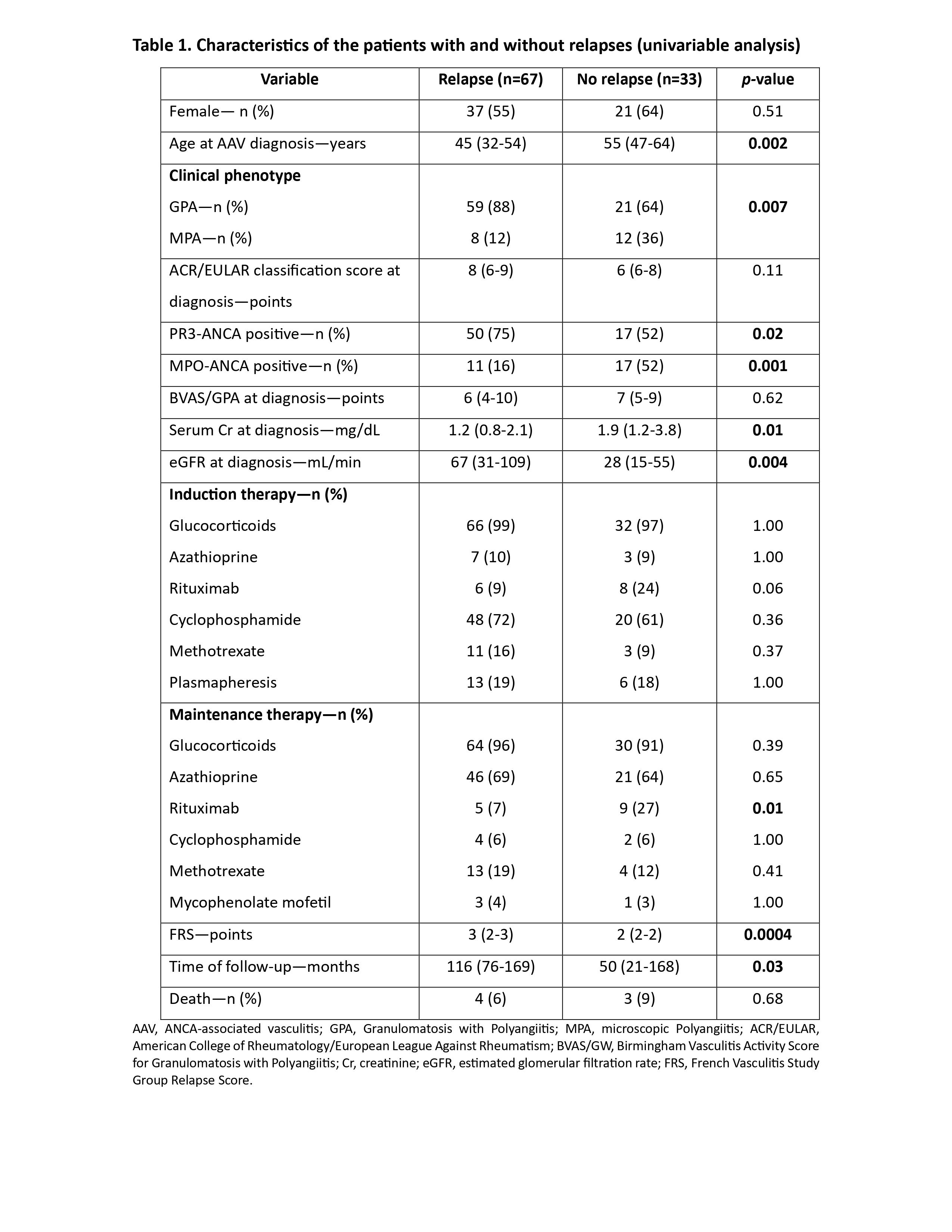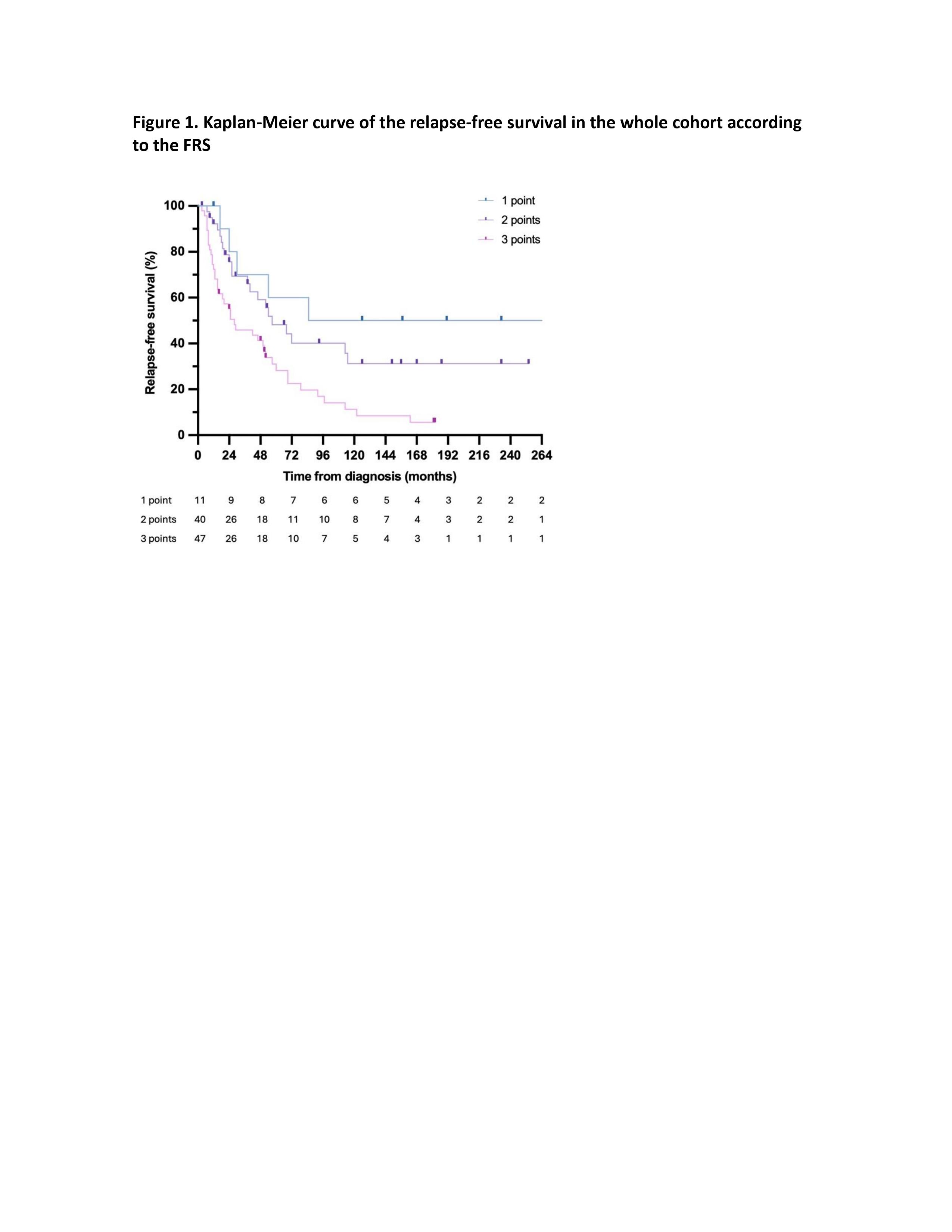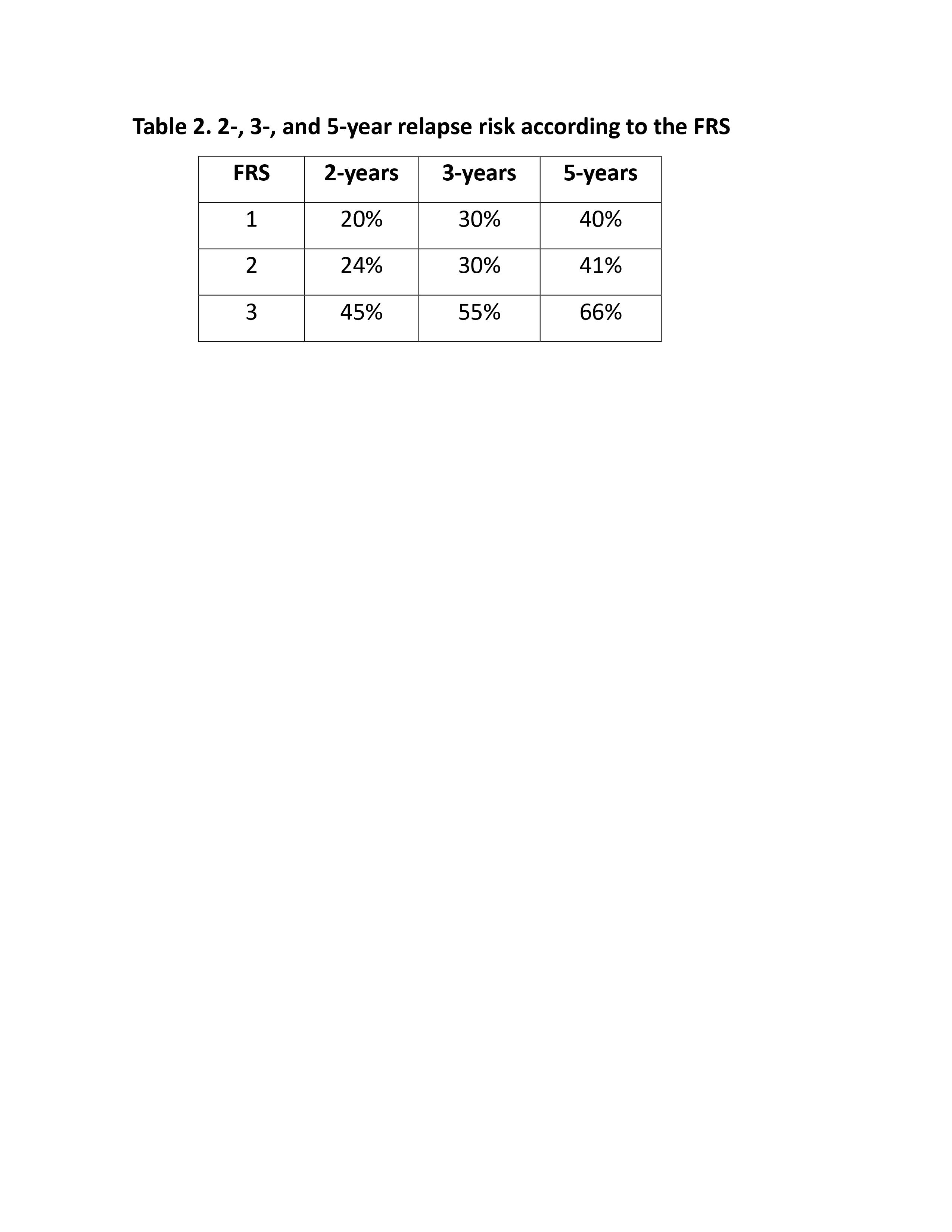Session Information
Session Type: Poster Session A
Session Time: 10:30AM-12:30PM
Background/Purpose: Anti-neutrophil cytoplasm antibody-associated vasculitis (AAV) encompass a group of systemic inflammatory diseases with multi-organ involvement. Relapses occur in 14-44% of patients within 18-36 months of follow-up and are associated with organ damage and increased mortality. The French Vasculitis Study Group Relapse Score (FRS) was recently proposed as a model to predict the risk of relapse in AAV. It includes the parameters of PR3-ANCA positivity, glomerular filtration rate (GFR) ³ 30 mL/min/1.73 m², and age ≤ 75 years at diagnosis, with a score ranging from 0 to 3 points. The study aim was to assess the risk factors associated with relapse and the performance of the FRS in a Mexican cohort of AAV patients.
Methods: This was a retrospective cohort study including patients with AAV (granulomatosis with polyangiitis (GPA) or microscopic polyangiitis (MPA)) who were followed for at least 12 months at a referral center in Mexico City until the first relapse, death, or last follow-up visit. Variables included demographic, clinical, laboratory, and treatment data. Statistical analysis included descriptive statistics, univariable (Student’s t test, Chi-square test, Fisher’s exact test, or Mann-Whitey U test) and multivariable (logistic regression) analyses, Kaplan-Meier survival curves, and log-rank test.
Results: One-hundred patients were included, 42 (42%) men and 58 (58%) women, with a median age at diagnosis of 49 years (IQR 34-58 years). Eighty (80%) had a diagnosis of GPA and 20 (20%) had MPA. At the time of AAV diagnosis, the median BVAS/GPA score was 6 points (IQR 4-10). Over a median follow-up period of 25 months (IQR 12-54 months) from AAV diagnosis, 67 patients (67%) experienced a relapse, whereas 33 (33%) remained relapse-free. Seven patients (7%) died over a median follow-up time of 49 months (IQR 21-106 months). Table 1 summarizes the characteristics of patients with and without relapses. The variables at diagnosis independently associated with relapses were: age (OR 1.05, 95% CI 1.01-1.08, p=0.14), PR3-ANCA positivity (OR 3.22, 95%CI 1.14-9.11, p=0.027), and serum creatinine (OR 1.19, 95% CI 1.02-1.38, p=0.03). The FRS was independently associated with relapses (OR 2.78, 95% CI 1.47-5.26, p=0.002), whereas maintenance treatment with rituximab was a protective factor (OR 0.14, 95% CI 0.03-0.56, p=0.005). Of the relapses, 34 (51%) were major and 34 (51%) were minor. The most frequent manifestations during relapses were renal, ocular, and pulmonary. The FRS distribution was: 0 points (n=2), 1 point (n=11), 2 points (n=40), and 3 points (n=47), with discrimination between each score excluding 2 patients with a FRS=0 (log-rank p=0.001). The median relapse-free survival was: 179, 57, and 28 months for scores of 1, 2, and 3 points, respectively. Figure 1 displays the relapse-free survival according to the FRS, whereas Table 2 shows the 2-, 3-, and 5-year relapse risk according to the FRS.
Conclusion: In this cohort, relapses were frequent. Nearly half of the patients had a FRS of 3 points at diagnosis. Risk factors associated with relapse included the individual components of the FRS, and the 5-year relapse risk was 40% for a FRS of 1, %, 41% for a FRS of 2, and 66% for a FRS of 3.
To cite this abstract in AMA style:
Hinojosa-Azaola A, Sandino-Bermúdez M, Mulia-Soto A, Mejía-Vilet J, Martin Nares E. Factors Associated with Relapses and Performance of the French Vasculitis Study Group Relapse Score in a Cohort of Mexican Patients with ANCA-Associated Vasculitis [abstract]. Arthritis Rheumatol. 2024; 76 (suppl 9). https://acrabstracts.org/abstract/factors-associated-with-relapses-and-performance-of-the-french-vasculitis-study-group-relapse-score-in-a-cohort-of-mexican-patients-with-anca-associated-vasculitis/. Accessed .« Back to ACR Convergence 2024
ACR Meeting Abstracts - https://acrabstracts.org/abstract/factors-associated-with-relapses-and-performance-of-the-french-vasculitis-study-group-relapse-score-in-a-cohort-of-mexican-patients-with-anca-associated-vasculitis/



